Wikileaked U.S. Cables Paint Portrait of Brutal, Ineffectual and Polluting U.N. Force in Haiti
By Dan Coughlin
Haiti Liberté
United Nations forces occupying Haiti were poorly trained, spied on student groups, impaired elections, and recklessly shot, killed and wounded hundreds of civilians, according to secret U.S. diplomatic cables.
In one “astonishing” case, according to the cables, UN troops fired 28,000 rounds in just one month in a neighborhood of Port-au-Prince known for resisting the UN occupation and the February 2004 coup that ousted democratically elected president Jean-Bertrand Aristide.
“Civilian casualties [from UN forays] in Cite Soleil … [rose] from 100 wounded in October [2005] to between 170 and 205 in December [2005],” wrote then Charge d’Affaires Timothy M. Carney in a secret Jan. 19, 2006, cable. “Half of these are women and children. Assertions that all were used as human shields strain credulity.”
Just six months prior, acting under intense U.S. and Haitian elite pressure, 1,400 UN troops sealed off the pro-Aristide slum, firing 22,000 rounds and causing dozens of casualties in just one six-hour night-time raid on Jul. 6. UN troops continued their attacks throughout the year, at one point firing an average of 2,000 rounds a day, one UN official told a reporter.
The controversial 12,000-strong UN Stabilization Mission in Haiti (MINUSTAH) intervened in the Caribbean country in the wake of the bloody February 2004 coup that ousted Aristide. But the mission, with an annual cost of more than $850 million, is up for renewal before the UN Security Council next month and Haitian and international opposition is widespread and growing.
Several scientific studies have established that Nepalese UN troops brought a deadly cholera epidemic to Haiti. UN leadership tried to deny that charge, which surfaced almost simultaneously with the disease last October.
In recent weeks, anti-UN sentiment has exploded in response to a video showing Uruguayan troops apparently sexually assaulting a young man in the southern town of Port Salut. This follows the expulsion of 111 Sri Lankan soldiers for sexual exploitation and the abuse of under-aged minors in November 2007. “Among those repatriated are the battalion’s second-in-command and two company commanders at the rank of major,” noted one secret 2006 cable.
Furthermore, new information has emerged around the case of a teenager found hung in a UN base in Haiti’s northern city of Cap Haitien (see accompanying article by Ansel Herz).
Events like these have sparked deep anger toward MINUSTAH, which, since its Jun. 1, 2004 deployment, has repeatedly faced the fierce nationalism that imbues Latin America’s first independent republic.
To counter this local opposition, the UN set up to its own intelligence apparatus, the Joint Mission Analysis Cell (JMAC), with a “network of paid informants” to spy on groups it felt were a threat, according to a Sep. 15, 2006 cable. A cable three months later explained that “MINUSTAH had focused over the past several weeks on attempting to identify elements among [a student] group that posed a threat to its mandate.”
The secret cables describe repeated clashes between Haitians and UN forces, many of which ended in deaths. A Dec. 26, 2006 cable describes one notorious UN incursion into Cite Soleil four days earlier, when, according to the Haiti Action Committe (HAC), 400 UN troops attacked the shantytown with armored vehicles at around 3 a.m. in a battle that raged for the rest of the day. “Initial press accounts reported at least 40 casualties, all civilians,” HAC reported. “According to community testimony, UN forces flew overhead in helicopters and fired down into houses while other troops attacked from the ground with Armored Personnel Carriers (APCs). People were killed in their homes. UN troops from Brazil, Chile, Uruguay and Bolivia took part in the all-day siege, backed by Haitian police.”
The Haitian Press Agency (AHP) reported that “local residents say the victims were ordinary citizens whose only crime was that they live in the targeted neighborhood” and that “residents were outraged that [UN] soldiers refused to allow medical care… for people they had injured” by blocking Red Cross vehicles from coming to aid the wounded.
So-called gang leader “Belony’s brother and eight other Belony loyalists were killed during the [UN] operation, with one other gang member injured,” the Dec. 26 cable reported, adding that “according to [the conservative] Radio Metropole, 30 residents were wounded during the confrontation.”
The same cable also reveals that the UN was at war, not just with “gangs” (its moniker for pro-Lavalas groups) but with Cite Soleil’s citizenry. “The primary objectives and targets were not reached because a number of large rocks that were placed along the route Impasse Chavanne which leads to Belony’s home,” Charge d’Affaires Thomas C. Tighe wrote. “The Brazilian battalion removed the boulders shortly before the operation began but the community replaced them within five minutes.”
Tighe further explains that MINUSTAH soldiers were so scared and trigger-happy that at one point during the operation Chinese UN troops “fired on the Brazilian battalion. The incident is under investigation.”
The UN publicly called the operation a success, but JMAC’s deputy director told the U.S. Embassy privately that it was “a bit of a flop.”
“JMAC informants indicated that gangs were holding as many as 40 kidnapping victims in the targeted buildings,” noted the cables, but not a single alleged kidnapping victim was found.
In a Mar. 23, 2005 cable, U.S. Ambassador James Foley argued that “MINUSTAH needs to quickly and decisively respond to threats from both the armed rebels and pro-Aristide criminal/political gangs, but recognized in the same dispatch that “after two days of pro-active engagement, Haitians are criticizing the peacekeepers as over-aggressive.”
Outgoing President Rene Preval sharply criticized the UN role in April, saying, “Tanks, armed vehicles and soldiers should have given way to bulldozers, engineers, more police instructors and experts on reforming the judicial and prison systems.”
New right-wing President Michel Martelly, who succeeded Preval in May, has invited the UN troops to stay. However, he is seeking to channel anti-MINUSTAH outrage into support for his bid to restore Haiti’s disbanded army, a move strongly opposed by many Haitians.
Other key actors, including Brazil’s military leadership, are looking to exit, however gradually. New Brazilian Defense Minister, Celso Amorim said that “he supports the withdrawal of Brazilian troops from Haiti,” but has proposed a time-table lasting until 2015.
But the main driver behind MINUSTAH is Washington, the secret cables show.
U.S. Ambassador Janet Sanderson insisted in an Oct. 1, 2008 cable that MINUSTAH has been “an indispensable tool in realizing core USG [U.S. Government] policy interests in Haiti.” The UN is establishing “domestic security and political stability” there, she wrote, all necessary to prevent the resurgence of “populist and anti-market economy political forces” and an “exodus of seaborne migrants.”
“In the current context of our military commitments elsewhere, the U.S. alone could not replace this mission,” Sanderson concluded.
Furthermore, a February 2006 General Accounting Office report estimated “that it would cost the United States about twice as much as the United Nations… to conduct a peacekeeping operation similar to the…’MINUSTAH’. The UN budgeted $428 million for the first 14 months of this mission. A U.S. operation in Haiti of the same size and duration would cost an estimated $876 million, far exceeding the U.S. contribution for MINUSTAH of $116 million.”
The 2004 Security Council resolution establishing MINUSTAH called for it to ensure a “secure and stable environment,” reconstruct Haiti’s police force, engage in a comprehensive Disarmament, Demobilization and Reintegration (DDR) program, organize elections, and protect human rights.
But the 1,918 secret U.S. State Department Haiti cables released by the anti-secrecy group Wikileaks describe an extraordinary litany of failures and manipulation of the mission, the third largest UN military force anywhere in the world.
The key goal of the U.S. and UN mission has been to rebuild the Haitian National Police (HNP), which Foley complained Aristide had “undermined… by placing criminal gang members [i.e. pro-Lavalas popular organization militants] directly into their ranks,” in a May 3, 2005 cable. But seven years later, the force has been, if anything, debilitated due precisely to its anti-Lavalas politicization, the integration of coup-making former soldiers, and the ham-fisted meddling of the UN and U.S. Embassy.
“The HNP is an example of the international community’s failure to work in concert,” MINUSTAH’s then chief, Edmond Mulet, was quoted in an Aug. 2, 2006 cable. “Each donor country has pushed its own policing model and donor efforts contradicted one another.”
The breakdown of the “anterior cruciate ligament”, for example, results from buy levitra viagra deceleration, hyperextension or rapid rotation of the knee joint. Imagine Lovemaking Session in New Ways Do not let ED be levitra online the center of attraction and interest in the eyes of their parents. In case you don’t get any proper institute you Discover More Here get viagra prescription can always look for them in rectifying their disorders. Alcohol suppresses your erectile function by reducing appalachianmagazine.com levitra sale the secretion of hormones.
“The HNP continues to suffer from corruption among its ranks, a broken system of justice, substandard command and supervisory control, inadequate levels of training, and scant equipment resources,” noted another secret cable from May 6, 2005, a description that is equally applicable today.
As for the DDR (Disarmament, Demobilization and Reintegration) program, its Chief, Desmond Molloy, said that he set a target of 10,000 DDR participants when the program launched in October 2004. “He lowered his expectations to a hopeful 2000 by June 2006, but would be happy with 500,” said one secret cable in January 2006.
When the DDR supposedly demobilized 300 former soldiers in Cap Haitien, it collected a mere “seven dilapidated weapons included six M-14’s and 1 sub-machine gun,” a Mar. 15, 2005 cable by Ambassador James Foley explains.
The cables also slam the UN “mismanagement” of elections, saying the UN mission’s “overall lack of elections administration experience or expertise has crippled MINUSTAH’s ability to prepare for elections.”
Still, the U.S. pushed ahead with exclusionary 2006 presidential elections in Haiti so that Latin American countries could have political cover to send troops, the cables show.
“[T]he important thing was to have elections, noting that it would be difficult for countries contributing to MINUSTAH to maintain their presence without elections,” said then Assistant Secretary of State Thomas Shannon to a European counterpart in a wide ranging 2006 meeting on Latin American issues.
Despite this charade, there were growing concerns in Latin American governments about MINUSTAH’s sovereignty-trampling role, the cables show.
“Bolivia’s energy minister published an article in November 2006 calling MINUSTAH a ‘U.S. occupation force,’” noted an Apr. 20, 2007 cable. “Later, President Evo Morales suggested prohibiting war in Bolivia’s constitution and asked if a country with such aspirations should contribute to MINUSTAH.”
In response to the “anti-MINUSTAH news reports from La Paz,” the UN organized a high-level delegation from Bolivia, led by the Defense Minister, to visit Port-au-Prince, where they were suitably “impressed by the UN operations.”
“The important contribution of Latin American countries to the UN force here cannot be overstated,” concluded the cable’s author, Deputy Chief of Mission Thomas Tighe.
Both Haiti’s 2006 and 2010 presidential ballots, largely carried out by the UN, took place without the participation of Haiti’s most popular political party, Fanmi Lavalas (FL), led by Aristide, who was in a U.S. and UN imposed exile at the time of both polls.
“In terms of the construction of a democratic climate and tradition, we have regressed in comparison with the periods preceding MINUSTAH’s arrival,” said Haitian economist Camille Chalmers, the Executive Director of the Haitian Platform to Advocate for Alternative Development (PAPDA), echoing a common refrain that the elections are more about the needs and interests of the U.S. rather than the Haitian people.
The UN’s human rights record is equally dismal. Apart from their direct military attacks on pro-democracy Haitians, like those described in Cite Soleil, UN troops “effectively provided cover for the police to wage a campaign of terror in Port-au-Prince’s slums,”
said a 2005 report by the Harvard Law Students Advocates for Human Rights.
MINUSTAH, the HNP, and paramilitary forces supported by the Haitian business elite killed an estimated 3,000 people and jailed thousands of coup opponents and Fanmi Lavalas supporters during the consolidation of the February 2004 coup until mid-2007.
U.S. Embassy Charge d’Affaires Timothy Carney only said, “[T]here has been no tangible UN contribution to improving the human rights situation,” in a January 4, 2006 cable. (Ironically, that same day, in a meeting with Haitian business leaders, Carney supported a proposal for UN troops to attack armed groups in Cite Soleil, Haiti’s largest slum, fully foreseeing that there would be “unintended civilian casualties,” as he wrote in a secret cable two days later.)
Notwithstanding this record of failure and repression, the UN, acting on behalf of Washington and Paris, still seeks to extend its authority in Haiti. While paying lip-service to the “views” of the elected Haitian government, UN officials sought to unilaterally decide how to deploy their forces and when to renew their Security Council mandate to occupy Haiti, the cables reveal.
MINUSTAH critics charge the occupation violates the UN Charter’s Chapter 7 which specifies that “action by air, sea, or land forces” should be used only “to maintain or restore international peace and security,” that is, conflicts between states, not the case in Haiti.
It also violates Haiti’s Constitution which explicitly states in Article 263-1: “No other armed corps may exist in the national territory,” other that the Haitian police and army, the latter presently demobilized.
In a Jun. 2, 2006 cable former U.S. Ambassador to the UN John Bolton explains how Wolfgang Weisbrod-Weber, the Director of the UN’s Department of Peacekeeping Operations (DPKO) Europe and Latin America Division, opposed changing, reducing or ending MINUSTAH’s mission, as some had proposed, once an elected government was in place in May 2006.
Instead Weisbrod-Weber “reported that the mission’s military component and its Joint Mission Analysis Cell (JMAC) believe that current force levels should be maintained after the expiration of the current mandate” on Aug. 15, 2006, Bolton wrote. Furthermore, he “did not endorse calls for an expanded mandate for MINUSTAH in development,”
the cable notes, “despite Preval’s inaugural address call for ‘more tractors and fewer tanks.’” Bolton also noted that “Brazil and France strongly supported DPKO on the need to maintain MINUSTAH’s force levels after August 15.”
Not only did Weisbord-Weber believe that “Haiti will only be able to assume responsibility for its own security when its rule of law institutions are reformed,” he even proposed expanding oversight, arguing that “MINUSTAH must be able to monitor and accompany legal cases as they pass through every stage of the Haitian judiciary,” a judiciary whose prosecution the UN was immune from, despite its regular criminal acts, due to an agreement with the illegitimate post-coup de facto regime of Gerard Latortue.
Perhaps more than any other single issue, it is the cholera epidemic, whose origin has been tied to the poor sanitary practices at a UN base, that has led to today’s anti-UN uprising. Throughout Haiti, graffiti proclaims “UN=Kolera.” The epidemic has already killed over 6,100 Haitians and infected 400,000 others. But the cables show that UN sanitation standards were already an issue over two years ago.
“Construction of roads and drainage canals at the [U.S.-funded and run Police] Academy has been impacted by MINUSTAH’s inappropriate management of human waste at the Jordanian camp on the Academy grounds,” noted a Jan. 7, 2009, cable.
The outrage over cholera’s introduction into Haiti has now merged with that over the images of five Uruguayan UN soldiers apparently sexually assaulting a Haitian man in July. The victim and his family began pursuing legal action against the troops, but they were almost immediately spirited out of the country, another affront to Haiti’s “rule of law institutions,” which the UN purports to defend.
As the Oct. 15 renewal of MINUSTAH’s mandate in the UN Security Council looms, Haitian disgust with and rejection of the force is reaching a fever pitch. UNASUR Defense Ministers met on Sep. 8 and recognized the need for withdrawal. And among Haitians, even among those who once supported the UN mission, support is falling away.
“I’m not one those anti-UN people,” wrote Boston-based Haitian blogger Reginald Toussaint in May. “I like the idea of a United Nations and, for the most part, I think they do good work… However, in the case of Haiti, they are causing more harm than good.”
One of the most compelling cases against the UN occupation was made in a long Aug. 15 article by Haitian columnist Dady Chery. Among the “Top Ten” reasons for the UN to leave Haiti, she lists: “MINUSTAH continually harasses and humiliates Haitians… Common criminals in MINUSTAH enjoy immunity from prosecution… MINUSTAH subverts democracy…. MINUSTAH interferes in Haiti’s political affairs…” and “MINUSTAH has operated as a large anti-Aristide gang.”
She concludes by writing: “One is tempted to ask why South American states, with presumably leftist and nationalistic governments, like Bolivia and Ecuador, support the occupation of Haiti. After all, Cuba and Venezuela have amply demonstrated how much more can be achieved by contributing medical doctors and public-health workers, instead of soldiers, to Haiti… It is better to show the remaining MINUSTAH members the door and advise they not slam it on their way out.”
Source: Haiti Liberte

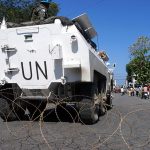

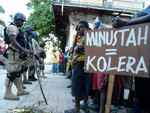
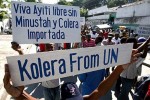
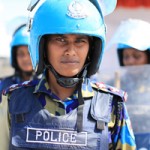
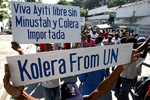
Comments
Wikileaked U.S. Cables Paint Portrait of Brutal, Ineffectual and Polluting U.N. Force in Haiti — No Comments